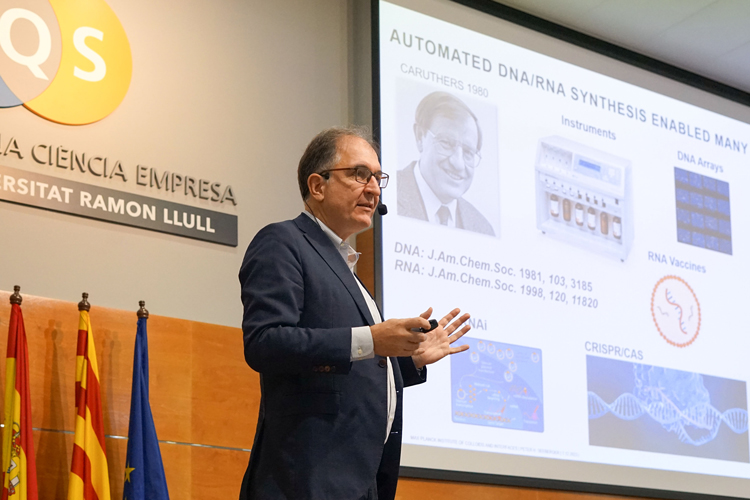IQS recently hosted the keynote speech by Dr Peter H. Seeberger on 1 December to celebrate the awarding of the 2022 Spanish-German Elhuyar-Goldschmidt Brothers Bilateral Prize, awarded by the Royal Spanish Society of Chemistry (RSEQ) at the end of November in Madrid jointly with the German Chemistry Society.

IQS recently hosted the keynote speech by Dr Peter H. Seeberger on 1 December to celebrate the awarding of the 2022 Spanish-German Elhuyar-Goldschmidt Brothers Bilateral Prize, awarded by the Royal Spanish Society of Chemistry (RSEQ) at the end of November in Madrid jointly with the German Chemistry Society. This award aims to recognize scientific research with an international scope that is carried out in both European countries in any field.
The professor and director of the Max-Planck Institute for Colloids and Interfaces (Potsdam, Germany) gave several lectures at the CIB-CSIC (Madrid), the IIQ-CSIC (Seville), the CIC bioGUNE (Bilbao), the CIC biomaGUNE (San Sebastian), and IQS (Barcelona).
Dr Antoni Planas, professor with the IQS Bioengineering Department, coordinator of the GQBB group, and current president of the RSEQ Carbohydrate Group, gave the welcome address to attendees. He presented the keynote speaker as "an eminence in the world of carbohydrate chemistry and biochemistry" and also explained Dr Seeberger’s research career, the different research groups he coordinates, and the number of awards and prizes he has received.
Dr Seeberger began his keynote speech, entitled "Automated Glycan Assembly enables the Glycosciences," by giving thanks for having the opportunity to come to IQS for the first time.
"Chemists can create many things, but automatic synthesis gives us access to multiple fields, such as automatic peptide synthesis," he explained. Carbohydrates are predominant biopolymers in materials and in nutrition. Within this group, glycan synthesis presents many challenges and difficulties, which can be rectified by the AGA (Automated Glycan Assembly) technology developed by Dr Seeberger and his partners. It entails a solid phase or continuous glycan synthesis platform (Flow Chem), which allows glycosylation reactions to be carried out by controlling several factors, with great precision, such as reproducibility, reducing reaction time, and so on. The incorporation of microwave heating technologies also facilitates shorter conversion times.
In this regard, Dr Seeberger presented some examples of application for AGA technology in various fields such as glycopeptide synthesis, peptide-glycan chimeras, vaccines and vaccine candidates, celluloses with "tailor-made" lengths and functionalities, applications of studies of glycans present in marine glycobiology and their applications, and applications in antimicrobial resistance.
The speaker also introduced some of his partners and the different research groups with which he works, in addition to the Center for the Transformation of Chemistry (CTC), a research centre that he has launched to develop circular and sustainable economy solutions.










